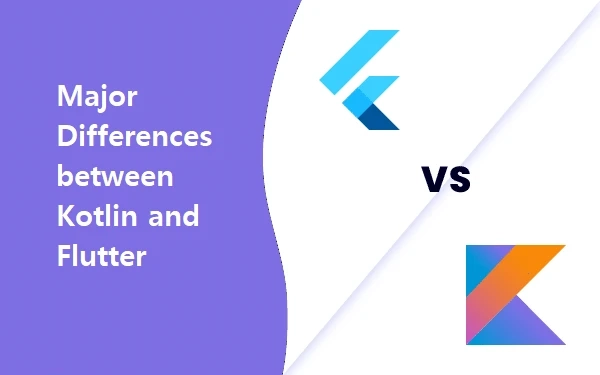Flutter is an open-source mobile app development framework written in the programming language called Dart and developed by Google. On the other hand, Kotlin is a general-purpose programming language that runs on the Java Virtual Machine and can be compiled to JavaScript source code or uses the LLVM compiler infrastructure.
Thus, it can be run on multiple platforms like Android, iOS, Linux, Windows, macOS, etc. Let’s take an in-depth look at some of the major differences between these two technologies in this article.
What is Kotlin?
Kotlin is an open-source statically typed programming language that runs on Java Virtual Machine. It was developed by JetBrains in 2011. Compared to Java, it has many features including simple installation, null safety, functional style programming, etc.
Due to its simplicity, it is one of the most rapidly growing languages for Android development. There are quite a few Kotlin developers for hire out there who can get you started with your next project without much hassle or complication.
What is Flutter?
Flutter is an open-source mobile application development framework for crafting high-quality native interfaces on iOS and Android in record time. It offers a set of ready-to-use elements that can be mixed together to build your custom UI. The framework also helps you write less code by leveraging existing widgets across different platforms. Your business logic works everywhere, while platform specifics are isolated to where they're required.
Benefits of Kotlin
Readability
Kotlin is an extremely readable language. This makes it a very good option for developing applications that will be read by your users or by other programmers in your team.
When you compare it to languages like Java, Kotlin requires fewer lines of code to achieve similar functionality, making it more concise, concise meaning that you can express what you want to do with less effort as opposed to verbose, which means that you need more words or symbols to communicate something clearly.
Interoperability
Both Kotlin and Flutter are based on Dart but work at cross purposes in terms of overall language interoperability. A Kotlin developer for hire (Android) would know that huge advantage to their language is that it can interoperate with Java. With Kotlin, developers can add new features into existing Java code with ease. They can also integrate fully functional Kotlin applications with JVM libraries.
Benefits of Flutter
Hot Reload
One of Flutter’s most exciting features is its hot reload feature. It allows developers to instantly see changes take effect while your coding process is still running. As long as your device is plugged in, nothing else needs to be restarted—no compile times, no IDE plugins. You just change what you want, hit save, and your app reloads in front of your eyes.
Full-customization of widgets
Flutter comes with rich, ready-to-use components, but that doesn’t mean you can’t customize your app. You can even create custom layouts by providing your own StatelessWidget and implementing an update method. While making full customizations may require quite a bit of coding experience, it is still possible with just some design work.
Accessible Native Features
One of Flutter’s biggest selling points is its ability to access native features, including hardware sensors. This allows developers to write applications that have a truly native feel without all of that pesky cross-platform development, which has been a major pain point for Android users in particular. If you’re developing an app that needs to make use of hardware like GPS or a camera, then building with Flutter can be a major benefit.
What are the Key differences between Kotlin & Flutter?
Kotlin vs Flutter performance
Kotlin app has higher stability than flutter. Stability is one of the major factors in designing apps and by extension, technology should be adopted as it will improve your app’s performance. There is no major difference between these two technologies on other parameters, except that Kotlin is generally easier to use than Flutter (Flutter apps take a longer time to design). But, still, a Kotlin developer for hire can easily shift from any framework to another.
Kotlin vs Flutter UI Experience
When we are developing any application, our priority is to make it user-friendly. In other words, developers have to give importance on UI so that users can easily use it without much effort. Flutter is a mobile app development framework used by Google. This is designed using the C ++ programming language. So when you will develop a hybrid application using flutter, first you will compile it into byte code after which it will be converted into machine code.
On this basis,
Flutter
Kotlin
Developed By
JetBrains
Programming Stack
Dart Programming language
Java, JVM, JavaScript, and Native for creating applications.
Performance
High as compared to kotlin
Low as compared to Flutter
Hot Reload
Supported
Not Supported
Conclusion
Kotlin is a statically typed programming language that can be used to build desktop, web, and mobile applications. Kotlin also aims to have an approachable syntax while also offering advanced functionalities like null safety. Flutter on other hand is a framework that allows you to build cross-platform applications using a single codebase. Because of its nature and benefits, Kotlin quickly rose in popularity, becoming Google's preferred language for native Android development over Java.
0


